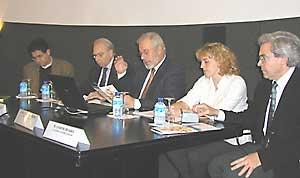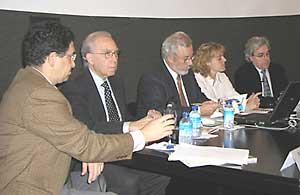Bioethics: how to define and solve problems
2003/11/13 Imaz Amiano, Eneko - Elhuyar Zientziaren Komunikazioa

- Dña. Leire Eskajedo, of the Interuniversity Chair of Law and Human Genome (UPV-Deusto).
- D. D. Marcelo Palacios, Chair of the Scientific Committee of the International Bioethics Association SIBI.
- D. D. Carlos Alonso, of the Center of Molecular Biology Severo Ochoa.
- D. D. Enrique Iáñez, from the Institute of Biotechnology of the University of Granada.
First each has held a 10-minute session and then time has been left for the debate. Carlos Alonso has given his point of view in the first place and has considered the proper definition as an essential starting point to address the problems of bioethics, and considers that in this way he could have done half work in the solution.
For this definition, however, the proper identification of the problem is necessary, that is, the identification of the discussion area (predictive medicine, healing, technological and cultural distribution north/south induced by biotechnology…). ii) an adequate characterization of the identified problem, taking into account where and when it has occurred. After the definition, however, it comes to solve the problem and for it has mentioned 3 ways: i) the situation or the objective mode (to analyze and solve), but it says that this form has changed, in the absence of a truth or an absolute and objective situation; ii) Analyzing rationally, but here we also have a different way of rationalizing each one; and iii) seeking and developing the truth, which understands that it does not serve to bring concrete strategies to a debate.
Leire Eskajedo has been the second to give her point of view. In particular, add a supplement to the title: "From the point of view of law". According to him, the right is extremely formalized, with its advantages and risks. Law regulates almost all facets of our life, which often gives people a feeling of false security. And in biotechnology, society demands the same sense of security. The conflicts generated by biotechnology have been divided into five groups: intimacy of people, manipulation of human DNA, freedom of research, biotechnological patents and their impact on health and the environment. The right to regulate all of them has not invented anything and sees the need for a plural debate. However, it affirms that there are current norms –international, European…–. Finally, Leire Eskajedo considers that the effectiveness of the right in biotechnology goes through three points: i) overcoming national borders in view of the current level of globalization, ii) preventing the abusive use of biotechnology, but without hindering research and iii) crossing the values of our social and legal system: individual rights, the environment and the right to research.

Enrique Iáñez, after praising the importance and depth of what was said by the previous ones, wanted to unite two areas: social debate and freedom of investigation into the ethics of biotechnology. In his opinion, biotechnology is an ideal place for there to be tests as to whether society influences technology. He has claimed the need to establish how society should influence to solve the problems: only through expert committees, with open debates… He has pointed out two of the concerns that biotechnology generates: its impact on human nature to the extent that it can be able to artificially change the character, and especially on embryo research, especially on eugenics.
Finally, Manolo Palacios has given his point of view. He has spoken extensively about the advances and risks of biotechnology, but in the end he has picked up what was said in the principles he considers that it should be bioethics: (i) he affirms that the principle of self-criticism is fundamental; (ii) the need for heterocrytic as follows, (iii) the need to know and accept objective reality; (iv) the responsibility of agents or inductors (physicians, entrepreneurs, politicians…) regarding the receptors; and (v) respect for privacy All this with the idea that the only company is humanity. And that, yes, informed and understood in a comprehensible way by society itself.
After these interventions, the public has asked a couple of questions about which they have reflected on the influence of religion and beliefs on biotechnology, the influence of multinationals on biotechnology research, on the need to inform society in an adequate way and without drowning… Topics of interest that are at the head and that generate concern.

Gai honi buruzko eduki gehiago
Elhuyarrek garatutako teknologia





